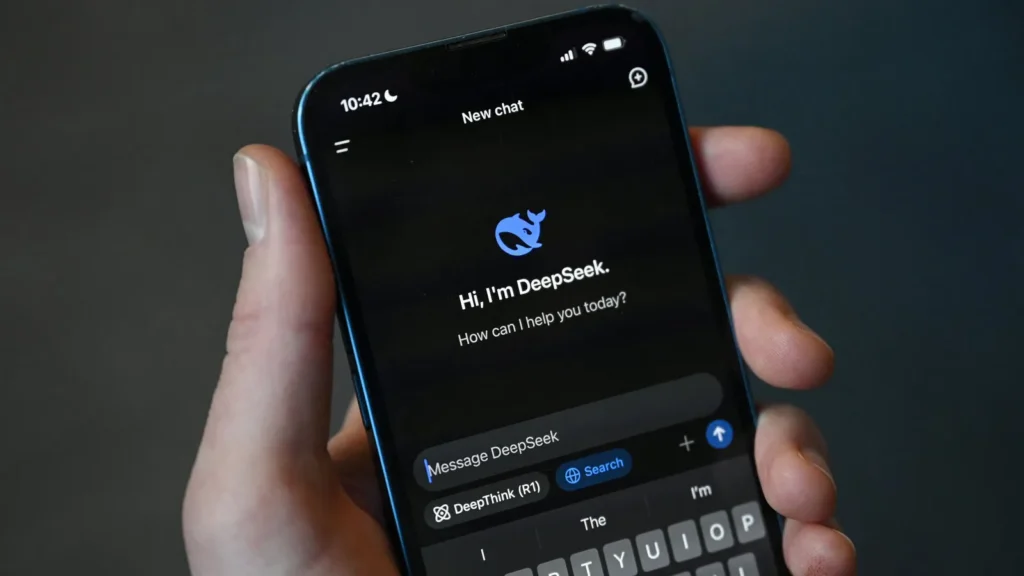Introduction
In today’s fast-paced digital era, search engines have become an integral part of our daily lives. Google has dominated the search engine landscape for decades, setting the gold standard for web search. However, a new player, DeepSeek AI, is emerging as a powerful AI-driven alternative to Google. But does it have the potential to replace Google? More importantly, can it address the real-world problems users face, especially in regions like Pakistan? This article explores DeepSeek AI’s capabilities, its strengths, and whether it can truly revolutionize AI-powered search and data analysis.

Key Points Overview
- What is DeepSeek AI, and how does it work?
- How does it compare to Google?
- The impact of AI-driven search engines on Pakistan’s digital landscape.
- Challenges and limitations of AI-powered search.
- The future of AI technology trends and whether DeepSeek AI can surpass Google.
What is DeepSeek AI?
DeepSeek AI is an advanced AI-powered search engine and data analysis tool designed to enhance the search experience using artificial intelligence. Unlike traditional keyword-based search engines, DeepSeek AI leverages natural language processing (NLP), deep learning, and AI models to deliver more accurate, context-aware search results. Moreover, its ability to perform data analysis sets it apart as a multi-functional AI tool.
How DeepSeek AI Works
- AI-driven indexing: Instead of relying solely on backlinks and page rank algorithms like Google, DeepSeek AI uses machine learning to understand the intent behind queries.
- Conversational search: It enables a more human-like search experience, making it easier for users to find direct and relevant answers.
- Personalized recommendations: The AI adapts to users’ search behaviors, improving the relevance of results over time.
- Multimodal search: DeepSeek AI integrates text, voice, and visual search to offer a more dynamic and interactive search experience.
- Advanced data analysis: Businesses and researchers can use DeepSeek AI to process and analyze large datasets, offering insights into market trends, consumer behavior, and AI-driven analytics.
How Does DeepSeek AI Compare to Google?
1. Search Accuracy and Relevance
Google’s algorithms, powered by RankBrain, BERT, and MUM, have set a high bar for search accuracy. However, DeepSeek AI’s context-aware searches and conversational AI give it a unique edge. Instead of just ranking pages, DeepSeek AI understands user intent, making it ideal for complex queries.
2. AI Integration and Innovation
Google has already integrated AI into search through Google Bard and Search Generative Experience (SGE), but DeepSeek AI is built entirely around AI-first technology. It can predict user queries, summarize articles, and even generate new content based on search patterns. Additionally, its data analysis capabilities allow businesses to extract valuable insights from vast datasets.
3. Privacy and Data Handling
One of the biggest concerns with Google is data privacy. Google collects vast amounts of user data for targeted advertising. DeepSeek AI, on the other hand, aims to offer a more privacy-focused experience by reducing data tracking and providing AI-powered ad-free searches while ensuring secure data analysis operations.
4. Multilingual Search & Regional Support
For countries like Pakistan, where Urdu and regional languages are spoken alongside English, DeepSeek AI’s multilingual capabilities can offer better accessibility compared to Google’s traditional language indexing.
AI-Powered Search and Data Analysis: Impact on Pakistan
1. Addressing Pakistan’s Digital Divide
- Many people in Pakistan rely on mobile searches due to limited access to desktop internet.
- DeepSeek AI’s voice search capabilities can help non-English speakers access information more effectively.
- With Pakistan’s increasing internet penetration, an AI-powered search engine can bridge the digital literacy gap.
2. Transforming E-Commerce and Business Search
- Pakistani businesses rely heavily on Google SEO and paid ads for visibility.
- DeepSeek AI’s organic, AI-curated search can make local businesses more discoverable without the need for expensive advertisements.
- AI-powered data analysis can help businesses understand market trends, customer behavior, and competitor insights, empowering decision-making.
3. Boosting Education and Research Through AI
- Students in Pakistan struggle to find reliable educational content.
- DeepSeek AI’s context-aware summarization can enhance learning by providing structured, high-quality educational content without misinformation.
- Researchers and analysts can leverage DeepSeek AI’s data analytics tools to process large volumes of information and identify trends in technology, healthcare, and economics.
Challenges and Limitations of DeepSeek AI
1. Lack of Data Compared to Google
- Google has over two decades of data to refine search algorithms, whereas DeepSeek AI is still evolving.
- DeepSeek AI may struggle to index less popular websites accurately.
2. Monetization Challenges
- Google’s revenue comes from ads, allowing it to offer free services.
- DeepSeek AI’s ad-free model could face sustainability challenges unless it finds alternative monetization strategies.
3. Bias and Misinformation
- AI-generated search results can sometimes lead to biased or misleading answers.
- Without careful moderation, DeepSeek AI could face credibility issues similar to AI-powered content generation platforms.
The Future of AI-Powered Search Engines and Data Analysis
DeepSeek AI is part of a broader trend toward AI-first search engines and data analytics tools. While it presents a strong case as a Google alternative, it still faces significant hurdles before it can replace Google entirely. However, for niche markets like Pakistan, AI-powered search engines could provide:
- More personalized search experiences.
- Better accessibility for non-English speakers.
- Reduced dependency on paid search ads for business visibility.
- Advanced AI-driven data insights for businesses and researchers.
Conclusion
While Google remains the dominant search engine, DeepSeek AI’s rise marks a significant shift in the digital search landscape. With its AI-driven approach, privacy-focused model, multilingual capabilities, and data analysis tools, it presents a strong alternative for users seeking a more intelligent and user-centric search experience. However, whether it can truly surpass Google depends on data accessibility, adoption rates, and AI reliability. For Pakistan, where search engine optimization and accessibility remain key challenges, DeepSeek AI has the potential to be a game-changer—but only time will tell if it can truly redefine web search and AI-powered data analysis.
FAQs
1. Can DeepSeek AI replace Google as the dominant search engine?
While DeepSeek AI presents an innovative AI-driven approach, Google’s established data resources, infrastructure, and user base make it difficult to surpass. However, DeepSeek AI could dominate in niche markets like privacy-focused search and AI-powered analytics.
2. Is DeepSeek AI available in Pakistan?
DeepSeek AI is accessible worldwide, and its multilingual capabilities make it a strong option for users in Pakistan, especially those searching in Urdu and regional languages.
3. How does DeepSeek AI protect user privacy?
Unlike Google, which relies on user data for targeted ads, DeepSeek AI emphasizes privacy-first search, reducing tracking and ensuring secure data handling.
4. Can businesses benefit from DeepSeek AI?
Yes. Businesses can use DeepSeek AI for market research, competitor analysis, and AI-powered insights to optimize their strategies.
5. Will DeepSeek AI remain free to use?
Currently, DeepSeek AI offers ad-free search but may explore premium models in the future for sustainability.




